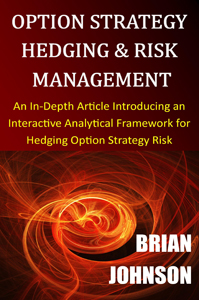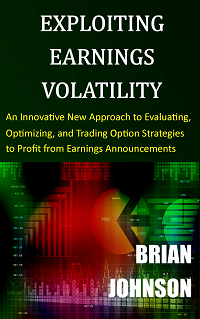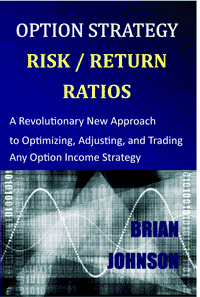Earnings are the single most important factor in stock valuation. Stock prices may diverge temporarily from earnings, but prices eventually correct. FACSET is one of the leading providers of software, research, analytical tools, and data for investment professionals. They publish a free, in-depth, weekly, Earnings Insight Report, which is an excellent and timely resource for all traders and investors. I have identified two insights from their most recent report (dated 12-31-2015) that have a direct bearing on the equity markets.
Declining Earnings
The most recent FACSET Earnings Insight report has a wealth of information, but the first item in their Key Metrics is the most troubling:
"For Q4 2015, the estimated earnings decline is -4.7%. If the index reports a decline in earnings for Q4, it will mark the first time the index has seen three consecutive quarters of year-over-year declines in earnings since Q1 2009 through Q3 2009."
The problem is simple; corporate earnings are not growing. It is highly likely that year-over-year earnings will decline for the third consecutive quarter. As explained in the FACSET report, this has not happened since the Great Recession. A pattern of declining earnings is consistent with a bear market, not a bull market, especially one with prices near the all-time highs.
P/E Ratio Too High
One of the simplest valuation metrics is the price/earnings (P/E) ratio. It is a blunt tool and there are several ways to calculate the ratio, but the current P/E ratio is so high, the conclusions would be the same, regardless of the methodology: the equity market is significantly overvalued.
According to the latest FACSET report, the Trailing 12-month P/E ratio for the S&P 500 index has been expanding consistently for the past four years and has now reached 18.0. The 5-year and 10-year average Trailing 12-month P/E ratio are only 15.3 and 15.6. Even if we use the higher average of 15.6 to represent fair-value, the market would still be overvalued by 15%.
Market Overvalued
The most recent FACSET report is not the only source that indicates the equity market is overvalued. I recently published a post that used a different valuation metric and some supplemental research to suggest the equity market could suffer a 58.9% decline in the next recession.
A recent MarketWatch article by Mark Hulbert concludes that "Stocks are more overvalued now than at 2000 and 2007 peaks:"
"The stock market currently is even more overvalued than it was at the bull market peaks of both March 2000 and October 2007 — according to not just one, but two, valuation measures. That at least is the message of an analysis released earlier this week by Ned Davis Research, the quantitative research firm.
... Ned Davis’s latest report focuses on something different: the median stock’s price/earnings and price/sales ratios. The median stock, of course, is the one for which exactly half have higher ratios and half have lower. By focusing on the median, Davis’s findings are immune from the charge that they are being skewed by outliers — such as the terrible earnings among energy companies."
Conclusion
Year-over-year earnings have been declining for three consecutive quarters. In order to earn a positive return in this type of environment, P/E ratios must continue to expand. The problem is that P/E ratios are already too high, using any reasonable calculation methodology
For P/E ratios to continue to climb, investors must be willing to pay an even higher price per dollar of earnings. What would justify higher P/E ratios? Rapidly growing earnings would do it, but year-over-year earnings are actually declining, not growing. Lower interest rates would also justify higher P/E ratios, but the Fed just began their campaign to raise interest rates. A reduction of risk premiums could justify higher P/E ratios, but if you have been reading my recent articles on Trader Edge, it would be hard to argue that risks to the equity market are declining.
So how will the equity market generate positive returns going forward? How indeed?
Print and Kindle Versions of Brian Johnson's 2nd Book are Available on Amazon (75% 5-Star Reviews)
Exploiting Earnings Volatility: An Innovative New Approach to Evaluating, Optimizing, and Trading Option Strategies to Profit from Earnings Announcements.
Print and Kindle Versions of Brian Johnson's 1st Book are Available on Amazon (79% 5-Star Reviews)
Option Strategy Risk / Return Ratios: A Revolutionary New Approach to Optimizing, Adjusting, and Trading Any Option Income Strategy
Trader Edge Strategy E-Subscription Now Available: 20% ROR
The Trader Edge Asset Allocation Rotational (AAR) Strategy is a conservative, long-only, asset allocation strategy that rotates monthly among five large asset classes. The AAR strategy has generated annual returns of approximately 20% over the combined back and forward test period. Please use the above link to learn more about the AAR strategy.
Brian Johnson
Copyright 2016 - Trading Insights, LLC - All Rights Reserved.
About Brian Johnson
I have been an investment professional for over 30 years. I worked as a fixed income portfolio manager, personally managing over $13 billion in assets for institutional clients. I was also the President of a financial consulting and software development firm, developing artificial intelligence based forecasting and risk management systems for institutional investment managers.
I am now a full-time proprietary trader in options, futures, stocks, and ETFs using both algorithmic and discretionary trading strategies.
In addition to my professional investment experience, I designed and taught courses in financial derivatives for both MBA and undergraduate business programs on a part-time basis for a number of years. I have also written four books on options and derivative strategies.












Declining Earnings in an Overvalued Market
Earnings are the single most important factor in stock valuation. Stock prices may diverge temporarily from earnings, but prices eventually correct. FACSET is one of the leading providers of software, research, analytical tools, and data for investment professionals. They publish a free, in-depth, weekly, Earnings Insight Report, which is an excellent and timely resource for all traders and investors. I have identified two insights from their most recent report (dated 12-31-2015) that have a direct bearing on the equity markets.
Declining Earnings
The most recent FACSET Earnings Insight report has a wealth of information, but the first item in their Key Metrics is the most troubling:
The problem is simple; corporate earnings are not growing. It is highly likely that year-over-year earnings will decline for the third consecutive quarter. As explained in the FACSET report, this has not happened since the Great Recession. A pattern of declining earnings is consistent with a bear market, not a bull market, especially one with prices near the all-time highs.
P/E Ratio Too High
One of the simplest valuation metrics is the price/earnings (P/E) ratio. It is a blunt tool and there are several ways to calculate the ratio, but the current P/E ratio is so high, the conclusions would be the same, regardless of the methodology: the equity market is significantly overvalued.
According to the latest FACSET report, the Trailing 12-month P/E ratio for the S&P 500 index has been expanding consistently for the past four years and has now reached 18.0. The 5-year and 10-year average Trailing 12-month P/E ratio are only 15.3 and 15.6. Even if we use the higher average of 15.6 to represent fair-value, the market would still be overvalued by 15%.
Market Overvalued
The most recent FACSET report is not the only source that indicates the equity market is overvalued. I recently published a post that used a different valuation metric and some supplemental research to suggest the equity market could suffer a 58.9% decline in the next recession.
A recent MarketWatch article by Mark Hulbert concludes that "Stocks are more overvalued now than at 2000 and 2007 peaks:"
Conclusion
Year-over-year earnings have been declining for three consecutive quarters. In order to earn a positive return in this type of environment, P/E ratios must continue to expand. The problem is that P/E ratios are already too high, using any reasonable calculation methodology
For P/E ratios to continue to climb, investors must be willing to pay an even higher price per dollar of earnings. What would justify higher P/E ratios? Rapidly growing earnings would do it, but year-over-year earnings are actually declining, not growing. Lower interest rates would also justify higher P/E ratios, but the Fed just began their campaign to raise interest rates. A reduction of risk premiums could justify higher P/E ratios, but if you have been reading my recent articles on Trader Edge, it would be hard to argue that risks to the equity market are declining.
So how will the equity market generate positive returns going forward? How indeed?
Print and Kindle Versions of Brian Johnson's 2nd Book are Available on Amazon (75% 5-Star Reviews)
Exploiting Earnings Volatility: An Innovative New Approach to Evaluating, Optimizing, and Trading Option Strategies to Profit from Earnings Announcements.
Print and Kindle Versions of Brian Johnson's 1st Book are Available on Amazon (79% 5-Star Reviews)
Option Strategy Risk / Return Ratios: A Revolutionary New Approach to Optimizing, Adjusting, and Trading Any Option Income Strategy
Trader Edge Strategy E-Subscription Now Available: 20% ROR
The Trader Edge Asset Allocation Rotational (AAR) Strategy is a conservative, long-only, asset allocation strategy that rotates monthly among five large asset classes. The AAR strategy has generated annual returns of approximately 20% over the combined back and forward test period. Please use the above link to learn more about the AAR strategy.
Brian Johnson
Copyright 2016 - Trading Insights, LLC - All Rights Reserved.
About Brian Johnson
I have been an investment professional for over 30 years. I worked as a fixed income portfolio manager, personally managing over $13 billion in assets for institutional clients. I was also the President of a financial consulting and software development firm, developing artificial intelligence based forecasting and risk management systems for institutional investment managers. I am now a full-time proprietary trader in options, futures, stocks, and ETFs using both algorithmic and discretionary trading strategies. In addition to my professional investment experience, I designed and taught courses in financial derivatives for both MBA and undergraduate business programs on a part-time basis for a number of years. I have also written four books on options and derivative strategies.